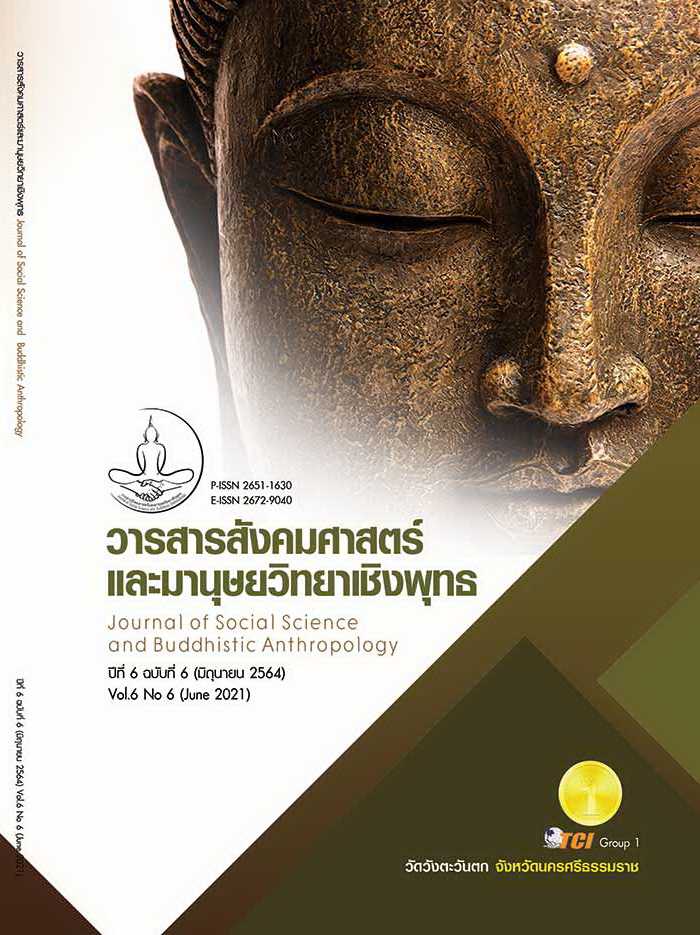THE CURRICULUM DEVELOPMENT TO ENHANCE KNOWLEDGE AND ABILITY OF TEACHER ON INSTRUCTIONAL FOR DEVELOP LEARNERS’ LEARNING AND INNOVATION SKILLS BASED ON PROFESSIONAL LEARNING COMMUNITY IN THE SECONDARY EDUCATIONAL SERVICE AREA OFFICE 23
Keywords:
Teacher Development, Professional Learning Community, Learning and Innovation SkillsAbstract
The objectives of this research article were to: 1) the composition knowledge and ability of teachers on instructional for develop learners’ learning and innovation skills. 2) The current and expect condition in develop. 3) The results of trial the curriculum to enhance knowledge and ability of teacher on instructional for develop learners’ learning and innovation skills based on professional learning community in the secondary educational service area office 23. 4) Satisfaction with the curriculum of teachers that receive develops in the curriculum. This research was the research and development. The samples of this research were the experts and teachers on secondary school in the secondary educational service area office 23. Data gathering by the questionnaire, performance assessment form and quiz, by used five experts on measurement for judgment and reliability was 1.00. percentage, mean and standard deviation were used to describe the data. The research findings were as follows: 1) the composition knowledge and ability of teachers on instructional have 10 compositions 40 indicators knowledge indicator 20 indicators, ability indicator 20 indicators and the compositions have most appropriate. 2) The total needs for developing the current condition have high level and expects condition have highest level. 3) The results of using the curriculum in knowledge; totally the samples have mean 93.60 accounted for 93.60 percent, in ability the workpiece be excellent level 4) The satisfaction on curriculum totally satisfied in highest. This research has the curriculum to enhance knowledge and ability of teachers in instructional for learners’ learning and innovation skills be used efficacious; because developed by systematically based on research and development process.
References
กลุ่มนโยบายและแผน สำนักงานเขตพื้นที่การศึกษามัธยมศึกษา เขต 23 . (2561). รายงานผลการดำเนินงานตามแผนปฏิบัติการประจำปีงบประมาณ พ.ศ. 2561 สำนักงานเขตพื้นที่การศึกษามัธยมศึกษา เขต 23. สกลนคร: กลุ่มนโยบายและแผน สำนักงานเขตพื้นที่การศึกษามัธยมศึกษา เขต 23.
พัชนี กุลฑานันท์. (2554). การพัฒนารูปแบบการฝึกอบรมครูแบบผสมผสานในการทำวิจัยในชั้นเรียน. ใน ดุษฎีนิพนธ์ครุศาสตร์อุตสาหกรรมดุษฎีบัณฑิต สาขาวิชาวิจัยและพัฒนาหลักสูตร. มหาวิทยาลัยเทคโนโลยีพระจอมเกล้าพระนครเหนือ.
วิจารณ์ พานิช. (2555). วิถีสร้างการเรียนรู้เพื่อศิษย์ในศตวรรษที่ 21. กรุงเทพมหานคร: ตถาตาพับลิเคชั่น.
สำนักงานคณะกรรมการการศึกษาขั้นพื้นฐาน. (2553). คู่มือการปฏิบัติงานข้าราชการครู. กรุงเทพมหานคร: โรงพิมพ์ชุมนุมสหกรณ์การเกษตรแห่งประเทศไทย.
สำนักงานเลขาธิการคุรุสภา. (2549). กฎหมายเกี่ยวกับการประกอบวิชาชีพทางการศึกษา. กรุงเทพมหานคร: สำนักงานเลขาธิการคุรุสภา.
สำนักงานเลขาธิการคุรุสภา. (2558). การดำเนินการรับรองปริญญาและประกาศนียบัตรทางการศึกษาเพื่อการประกอบวิชาชีพ. กรุงเทพมหานคร: โรงพิมพ์ สกสค ลาดพร้าว.
สำนักงานเลขาธิการสภาการศึกษา. (2555). ข้อเสนอเชิงนโยบายการพัฒนาครูและบุคลากรทางการศึกษา. กรุงเทพมหานคร: พริกหวานกราฟฟิค.
Dufour, R. & Dufour, B. (2012). The School Leader’s Guide to Professional LearningCommunities at Work. Retrieved June 19, 2017, from http://www.solution-tree.com
Martine, L. et al. (2010). Factors that promoteprogression in school functioning as Professional Learning Community.International. Journal of Education Policy & Leadership, 10(7) 1-14.
Partnership for 21st century skills. (2009). P21 Framework Definition. Retrieved June 19, 2017, from http://www.21senturyskills.org
Raymond, B. W. et al. (2012). Transforming Schools into Learning Organization: Supports and Barriers to Educational Reform. Canadian Journal of Educational Administration and Policy, 13(134) 1-32.
Shirley, M. H. (2010). Guiding Professional LearningCommunities: Inspiration, Challenge, Surprise, and Meaning. California: Corwin.









